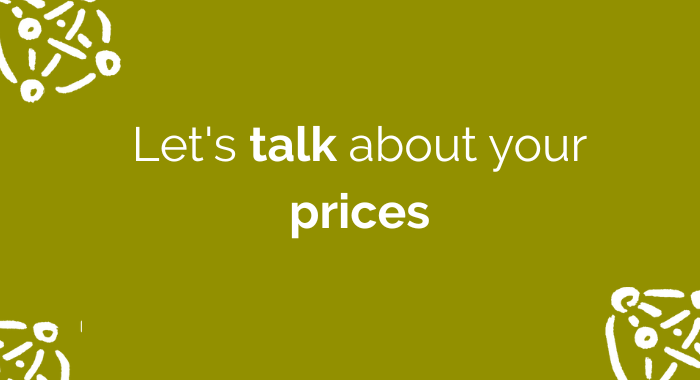Let's talk about your prices

There's something odd going on. Most of the people reading this are in business to make a living, and need their business to be profitable.
But when I try to get people to talk about their prices or to think about how they might be more profitable, many just don't want to address this crucial aspect of running their business.
I'm not sure why.
Because you didn't like maths at school? Because it's not British to talk money? Because you're not sure how to tackle pricing?
Because you're happy as things are? But are you also happy about how many hours you work, or how much money you have to invest in your business, in you and your family, or charities?
Let's start again. You're in business to make a living and need your business to be profitable.
So it stands to reason you'll have thought very carefully about the prices you charge?
Which method do you use to set your prices?
The copy-your-competition method?! Or do you look at your costs and then add a certain level of profit? Or is it just a question of what you can get away with or what you feel you would pay for the same service?
Pricing is as much part of your marketing strategy as things like social media or website.
The price you charge can make a difference to how people perceive your business so let's have a quick look at some pricing strategies.
There are several ways you can compete on price, that are always obvious.
Right now, many think they have to be cheap to succeed. That's not always the case. Cheap can make people mistrustful. Some visitors really want to go somewhere special or where they trust everything will be as they wish.
If you do decide that you want to compete by offering the lowest prices, be wary of getting in a downward price spiral and remember that there's little scope to discount for price-led promotions.
Some businesses successfully use higher prices to instil confidence in their business. This can make their business more aspirational. Obviously higher prices also raise expectations but if you have good reviews, the price-value ratio is clearly right. There's a saying 'quality is remembered long after the price is forgotten'.
The majority of businesses price themselves in the middle. It feels like a more comfortable place to be. It works for many.
The middle can be a muddle. It's a crowded market place and right now you might have to work harder to promote your business. You need to find something that helps you to stand out. If you're not getting as many visitors as you'd like, you might consider lowering your prices, but that can change perceptions of what you offer and you might find yourself on a downward spiral.
Whatever price you charge, if you’re not getting the level of business you want, my first recommendation is not to discount.
Spend a little time considering whether the price you charge is appropriate for what you offer. Assuming it is, the next step is to think through everything you include.
Don’t just say something like ‘the price includes entrance to Never Never Land’. Think about the value the offers for visitors.
So the entrance fee for Never Never Land might include ‘two hours (based on average dwell time) of fun and magical time together for families’. It might include ‘a mile of wonderful footpaths during which you can marvel at… or a chance to learn about… or ways to discover…’
Accommodation providers don’t just offer something like ‘bed and breakfast’ or ‘house for four people for a week’ - think about the benefits of what you offer to guests. ‘You’ll feel refreshed and invigorated waking up to the views of … from…’ or ‘guests love our choice of healthy breakfasts and generous servings so you barely need lunch’.
Once you’ve considered the value of what you offer, explain it in as many ways as you can, whenever you can.
Be proud of your pricing and you'll instil confidence in your business.


0 comments
Leave a comment